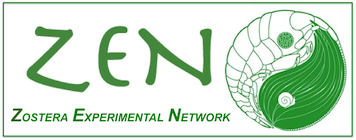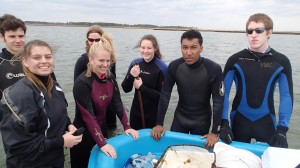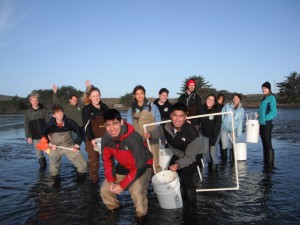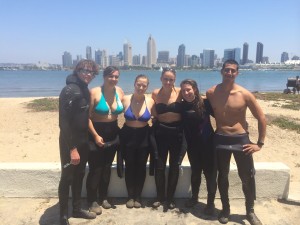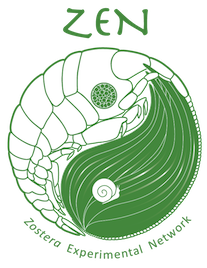The ZEN of Active Learning
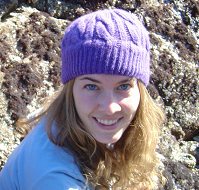 by Pamela Reynolds (ZEN postdoc and coordinator)
by Pamela Reynolds (ZEN postdoc and coordinator)
A novel component of ZEN2, in spring 2014 we launched a coordinated upper division undergraduate Seagrass Ecosystem Ecology course at each of the three core ZEN sites. Dr. Emmett Duffy and graduate student Jon Lefcheck instructed a group of 8 students at the College of William and Mary, Dr. Kevin Hovel and graduate student Erin Voigt taught 6 students at San Diego State University, and Drs. Jay Stachowicz and Pamela Reynolds co-taught another 12 students at the University of California, Davis. The course focused on ecological theory and hands on training in marine ecology field methods. We incorporated lectures and readings of the primary literature with field trips and student-led surveys and experiments.
Each course topic and experiment in the course corresponded to a main theme and goal of ZEN – from top-down/bottom-up ecology and biodiversity ecosystem functioning to experimental design and habitat restoration. In an immersion instruction style, students performed research typical in marine ecology, working both indoors and outdoors, with living organisms, under a wide variety of conditions. The students gave presentations both within their own class and, via teleconferencing, to the other ZEN classes. The course gave students a rigorous background in not only the “why” behind the science and a sense of the history of the field, but also the “how” of doing the science itself. With such small class sizes we were fortunate to be able to engage the students in this active learning style and to really connect with and get to know them. Success in the class was assessed by the students’ ability not to simply memorize facts, but to apply the core concepts of the course to design novel approaches and problem solve both individually and as a team. We hope that additional ZEN partners will engage with similar networked courses in the future and further strengthen the connections among our diverse partnership.
A subset of the students in the ZEN classes are participating in our ‘ZENternship’ program -a hands on training experience following the prior ZEN graduate student exchange program of 2012 and modeled after the NSF Research Experience for Undergraduates program. The ZENternship for 2014 involves student travel to different partner sites this summer to assist with ongoing ZEN research.
We were thrilled to have a great group of students participate in this first ZEN class and can’t wait to hear about their summer research experiences – both at home and abroad. And, we are all more than a little bit jealous that we didn’t have such an integrative class to take when we were undergraduates!
Check back here to read more about the ZENterns and their experiences conducting research at home and abroad this summer.
